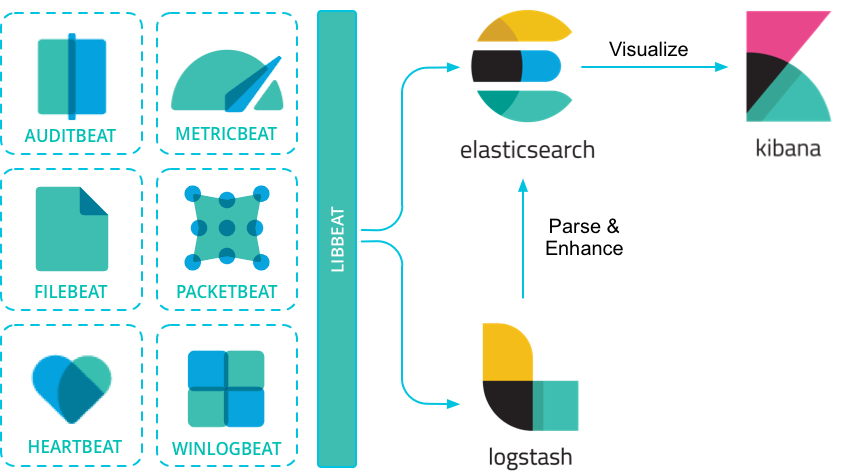What are Beats, how do they work
What are Beats?
Beats is a platform for lightweight data shippers that are designed to send various types of data to Elasticsearch or Logstash for processing, indexing, and visualization. Beats is part of the Elastic Stack and is used to collect data from various sources such as logs, metrics, and network packets. Beats are easy to install, lightweight, and have a small footprint, making them ideal for various distributed systems.
Beats consists of four different types of data shippers, each designed for a specific purpose:
- Filebeat: Filebeat is used to collect log data from various sources, including log files and the standard output of applications. Filebeat is lightweight and efficient and can be used to send data to Elasticsearch or Logstash for processing and analysis.
- Metricbeat: Metricbeat collects metric data from various sources, including servers, applications, and operating systems. Metricbeat is designed to collect real-time metrics and can be used to monitor system performance and identify issues.
- Packetbeat: Packetbeat is used to monitor network traffic and capture network data in real time. It can be used to identify and diagnose network performance issues, track application usage, and detect security threats.
- Auditbeat: Auditbeat collects audit data from various sources, including operating systems, applications, and security logs. It can be used to monitor and track system activity, detect suspicious behavior, and comply with regulations and standards.
Overall, Beats is an important component of the Elastic Stack and provides a lightweight, efficient way to collect and ship data from various sources. With its different types of data shippers, Beats can be used for various use cases such as log analysis, system monitoring, network analysis, and security analysis.
How ELK Stack Works with Beats
ELK stack works with Beats to collect, process, and analyze data from various sources in real time. Beats are lightweight data shippers that collect and send data to Logstash or Elasticsearch for further processing, indexing, and visualization.
Beats can be configured to collect data from various sources such as logs, metrics, network packets, and audit data. Once the data is collected, Beats can transform and filter the data before sending it to Logstash or Elasticsearch. This ensures that only relevant data is sent to the ELK stack for further analysis.
Logstash, a part of the ELK stack, can be used to process and filter the data Beats collects. Logstash provides a set of plugins that can be used to parse, filter, and transform the data before sending it to Elasticsearch for indexing. This enables more efficient data analysis and indexing, as Logstash can handle complex data transformations and enrichments.
Once the data is processed and indexed by Elasticsearch, Kibana can be used to visualize and analyze the data. Kibana provides a user-friendly interface to create dashboards, visualizations, and reports based on data stored in Elasticsearch. This allows users to gain insights and monitor system performance in real-time.
Overall, ELK stack and Beats work together to provide a complete data analysis solution that can be used for various use cases such as log analysis, system monitoring, network analysis, and security analysis. Beats provides an efficient and lightweight way to collect data, while ELK stack provides a scalable, real-time search and analytics platform for processing, indexing, and visualizing the data.

Subscribe to our YouTube channel: https://www.youtube.com/@CyberToolGuardian/featured
Follow us on Instagram: https://instagram.com/cybertoolguardian
Comments
Post a Comment